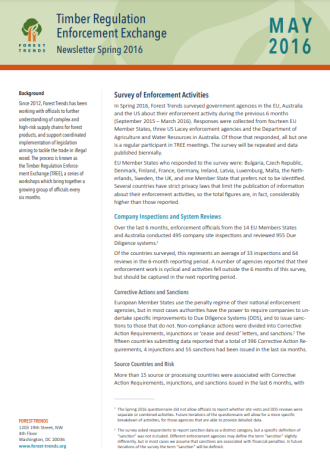
A recent survey by the research institute Forest Trends has provided the first systematic and publicly available assessment of the scale and type of enforcement activities under the European Union Timber Regulation (EUTR) and the Australian Illegal Logging Prohibition Act and Regulation. Forest Trends collected information about inspections and sanctions between September 2015 and March 2016 from the government agencies in the EU, Australia and US tasked with implementing enforcement activities under the timber legality regulations in these countries. The agencies that submitted responses to the survey included the competent authorities from fourteen of the twenty-eight EU Member States and the Australian Department of Agriculture and Water Resources.
The agencies from the 14 EU Member States and Australia reported that over the six-month reporting period their staff had conducted 495 company site inspections and reviewed 955 due diligence systems, resulting in an average of 33 inspections and 64 reviews in each of the respondent countries. The actual number of inspections is likely higher since privacy laws in some of the surveyed countries do not permit disclosing information about enforcement. Also, some countries conduct enforcement activities on a cyclical basis and expect to have data about enforcement activity in the next reporting period (April-September 2016).
The specific responses available to the different competent authorities vary, since each EU Member State has to follow the penalty regime defined by the national regulations. However, most EU competent authorities can provide companies with specific mandatory guidance on how to improve their due diligence systems, and can issue sanctions to companies failing to comply. Forest Trends categorized the enforcement actions as Corrective Action Requirements (396 instances over the reporting period in 15 countries), injunctions or ‘cease and desist’ letters (4 instances), and sanctions (55 instances).
The enforcement activities reported involved wood from more than 15 source or processing countries, with China, Brazil, Cameroon, Myanmar, and the Republic of Congo most frequently mentioned. The survey also asked about indications that purchasing patterns are shifting. The responses show that companies at this stage have changed suppliers because documents or independently verified chain of custody were not available from certain actors.
Where possible, the respondents were asked to disaggregate the targets of enforcement action into four possible categories: domestic forest producers, timber importers, furniture importers, and pulp/paper importers. Only some of the respondents were able to provide this level of detail. The responses provide for the first time a snapshot of current enforcement priorities.
The results of this survey show that at least some of the EUTR competent authorities are stepping up their enforcement efforts. The Forest Trends survey results are a timely response to criticism about the variation in levels of implementation of the EUTR by independent reviews commissioned both by the EU Commission as well as the European Court of Auditors. However, the results also show that more information is needed, particularly from EU Member States that did not submit information for this reporting period. Forest Trends will continue to collect enforcement information on a periodic basis and has received indications that more EU Member States will submit data in the future.
Three US Lacey Act enforcement agencies also shared information about three recent enforcement activities in the US. Since the Lacey Act in a criminal statute, it is enforced through different sorts of legal procedures, and thus is difficult to fit into the same framework used to assess enforcement in the EU and Australia. The first case, the United States v. Lumber Liquidators, Inc., was recently settled and led to the publication of the first specific guidance on compliance from the US Department of Justice in the accompanying compliance plan. A second case concerns a shipment of allegedly illegal timber from the Peruvian Amazon. US Customs has “excluded” the timber to deny entry into the country. The shipment is currently under investigation by US enforcement agencies. The Department of Homeland Security Investigations recently conducted a search at the offices of Global Plywood and Lumber Inc. in California in relation to this investigation. The third concerns the theft of bigleaf maple in the Pacific Northwest of the United States, marking the first time the U.S. government has prosecuted a Lacey Act case for illegal interstate trade of wood products within the country.